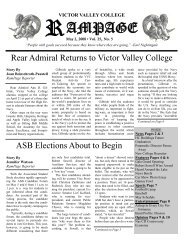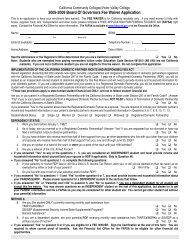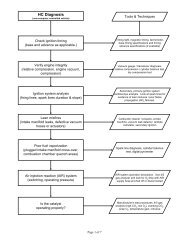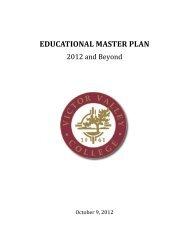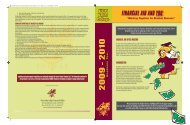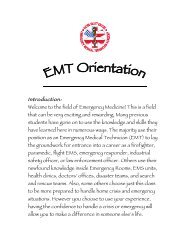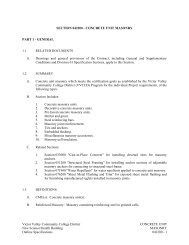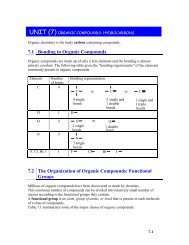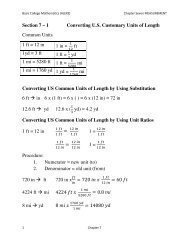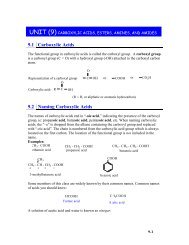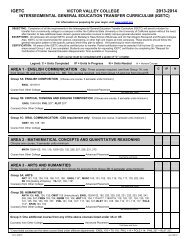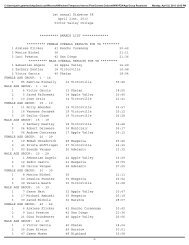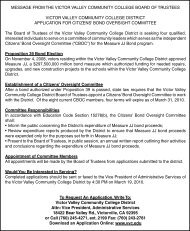Download - Victor Valley College
Download - Victor Valley College
Download - Victor Valley College
You also want an ePaper? Increase the reach of your titles
YUMPU automatically turns print PDFs into web optimized ePapers that Google loves.
PROGRAMS / COURSE DESCRIPTION<br />
This course focuses on the design, installation,<br />
configuration, operation and troubleshooting of 802.11a,<br />
802.11b, 802.11g, 802.11n wireless LANs. It delivers a<br />
comprehensive overview in a hands-on lab environment<br />
of wireless technologies, security, design, and best<br />
practices with emphasis on real world applications and<br />
case studies. Topics include wireless radio technology,<br />
wireless topologies, antennas, access points, bridges,<br />
wireless security, Guest VLAN, site survey, installation,<br />
management, diagnostic tools, monitoring, and<br />
discussions on wireless emerging technologies. It also<br />
prepares students towards obtaining Cisco Wireless<br />
LAN Support Specialist certificate.<br />
ELCT 79A MICROSOFT CERTIFIED SYSTEMS<br />
ENGINEER<br />
Units: 4.0 - 48-54 hours lecture and 48-54 hours<br />
laboratory. (No prerequisite. Grade Option)<br />
This is the first of a series of courses required for<br />
Microsoft MCSE certification. Topics will include<br />
installing Windows 2000 Professional, installing<br />
Windows 2000 by using Windows 2000 Server Remote<br />
Installation Services (RIS), deploy service packs,<br />
manage and troubleshoot access to shared folders,<br />
manage shared printers, configure Advance Power<br />
Management (APD), encrypt data by using Encrypting<br />
Files System (EFS), manage hardware profiles, and<br />
configure and troubleshoot TCP/IP protocol.<br />
ELCT 79B MICROSOFT CERTIFIED SYSTEMS<br />
ENGINEER II<br />
Units: 4.0 - 48-54 hours lecture and 48-54 hours<br />
laboratory. (No prerequisite Recommended: ELCT 79A<br />
Microsoft Certified Systems Engineer. Grade Option)<br />
The second in a series of courses required for Microsoft<br />
MCSE certification. Topics include: installing and<br />
configuring Microsoft Windows 2000 server; unattended<br />
installation of Windows 2000 server; Microsoft Windows<br />
2000 file systems and advanced file systems; active<br />
directory services; administering Microsoft Windows<br />
2000 server; administering print services; network<br />
protocols and services; routing and remote access<br />
services; Microsoft Windows 2000 security; monitoring<br />
and optimization; Microsoft Windows 2000 application<br />
servers.<br />
ELCT 80 FIBER OPTICS CABLING<br />
Units: 3.0 - 96-108 hours individualized instruction.<br />
(Prerequisite: ELCT 69)<br />
This course is designed to introduce students to fiber<br />
optic communications, transfer equipment and cabling.<br />
Students will explore fiber optics theory, operation of<br />
transfer equipment, assembly and repair of fiber optic<br />
cabling.<br />
ELCT 81 SOLDERING THEORY AND TECHNIQUES<br />
Units: 1.0 - 32-36 hours individualized instruction. (No<br />
prerequisite)<br />
This hands-on course is designed to provide the student<br />
basic soldering theory and techniques. Topics include:<br />
soldering theory, types of soldering irons, soldering iron<br />
tips, soldering guns, solder connections, and<br />
unsoldering techniques. Course includes construction<br />
project.<br />
ELCT 83 SMALL OFFICE/HOME OFFICE (SOHO)<br />
NETWORKING<br />
Units: 4.0 - 48-54 hours lecture and 48-54 hours<br />
laboratory. (No prerequisite. Grade Option)<br />
Small Office/Home Office (SOHO) course is designed<br />
for persons with little or no background in networking<br />
technologies to setup, operate, maintain and<br />
troubleshoot office/home Local Area Network (LAN).<br />
Topics include: Networking Components Identification<br />
and Installation, Installing, Configuring and<br />
Troubleshooting Basic Local Area Networks, Wireless<br />
Networking, Internet Access and Sharing, SOHO<br />
Network Security and Virus Protection, Microsoft<br />
Windows 2000/XP Network configuration and Resource<br />
Sharing, Video Conferencing for Telecommuters, and<br />
VoIP Networking.<br />
ELCT 84 COMPUTER NETWORKING<br />
Units: 3.0 - 96-108 hours individualized instruction. (No<br />
prerequisite)<br />
Students learn how to formulate network specifications,<br />
install, and maintain local area computer networks<br />
(LAN). Topics and activities include: fundamentals and<br />
protocols of data communications and communication<br />
architectures, selection, preparation, and installation of<br />
LAN cabling, network operating systems, and<br />
troubleshooting. Students will install and configure<br />
modems, connect telephone lines, operate modems,<br />
and transfer files. Satisfies computer industries A+<br />
certification requirements.<br />
ELCT 85 OPTOELECTRONICS: FIBER OPTICS<br />
Units: 3.0 - 96-108 hours individualized instruction. (No<br />
prerequisite)<br />
This high-technology laboratory course demonstrates<br />
the use of fiber optics in a wide range of applications<br />
including office copy machines, biomedical instruments,<br />
telephone communications, aircraft equipment,<br />
consumer products and motor vehicles. Topics include:<br />
operation and application of light emitters, detectors,<br />
fiber optic cables and associated hardware, data<br />
transfer, bar code scanning, and contactless switching.<br />
ELECTRONICS AND COMPUTER TECHNOLOGY<br />
2012-2013 <strong>Victor</strong> <strong>Valley</strong> <strong>College</strong> Catalog 207



